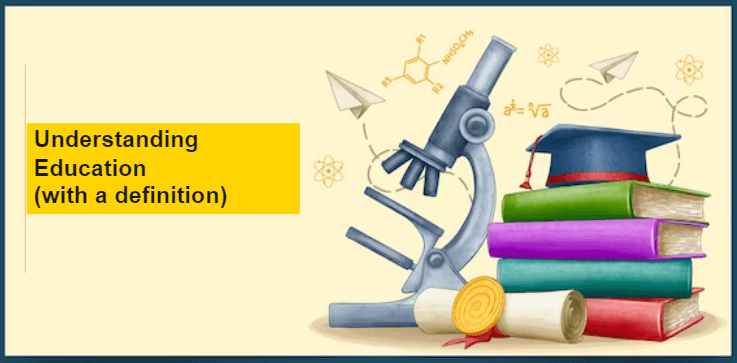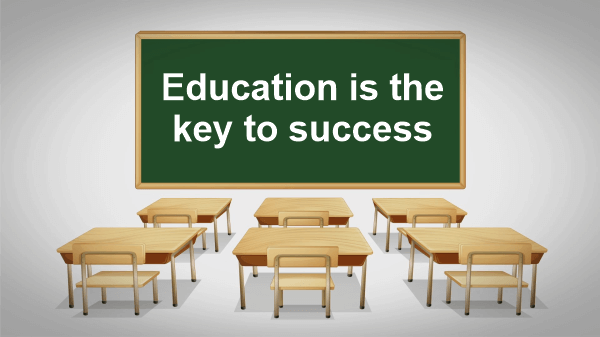Education DefinitionEducation is essential for both social and individual growth. People should understand the importance of education during their formative years. The idea that education and learning begin at home is quite common and widely acceptable. Our parents, grandparents, and siblings are frequently our first teachers. What gives education its purpose and value is its continuity. It takes a lifetime to learn everything. As a result, learning should never end. The development of each individual, their culture and the nation as a whole are all somewhat based on continuous learning. The future of the planet cannot be bright if the population and culture are untouched by education. Knowledge can be a tool for understanding society's rights and obligations as well as those of the entire nation. It increases one's capacity to see the world as an opportunity to grow and fight injustices like corruption, violence, and other problems. 
In this new article, we'll discuss education's importance in terms of both personal and societal growth. But, let us first understand the definition of education: Definition of Education"Education is the process of learning knowledge, skills, attitudes, beliefs, and habits". It entails teaching, training, and learning, and it might employ a range of tactics, such as drills, discussions, and lessons. Even though children have the ability to educate themselves, it is often done with the help of teachers. They know better which subjects are necessary to educate at different stages of life and help in shaping the future of the children. History of EducationThe evolution of effective teaching and learning techniques as well as the emergence of significant educational systems have been hallmarks of education history. The ancient centuries saw the oral transmission of stories, music and poetry from one generation to the next, which formed the basis for much of education. During the middle ages, the Catholic Church was the dominant supplier of education, and schools were established to teach Latin, religion, and basic literacy skills. In the 17th century, during the Age of Reason (The Enlightenment), the first public schools were established, modelled after Greece's Platonic Academy. Both the value of education and the worth of the individual were highly emphasized in these schools. In the 19th century, industrial societies first emerged, bringing with them new demands on education. Public schools, colleges, and universities were established during this period and provided a more formal education than their forefathers. Education advanced during the 20th century thanks to the introduction of compulsory education and the expansion of the modern university system. The development of online and distance learning, along with the development of new instructional technologies such as virtual reality as well as the growth of online and remote learning, have had a major impact on education in the twenty-first century. Education is always changing in the modern day as we search for novel methods of teaching and learning. Types of EducationIn general, education is classified into three major groups, namely formal, informal and non-formal education:
Some other forms of education may be defined as follows:
Importance of Education
One of the most important investments a person or individuals can make is in their education. It serves as the basis for societal progress as well as personal growth. The empowerment of people, the enhancement of their quality of life, and the general advancement of a country all depend heavily on education. Education is an essential part of life. It provides us with the knowledge and skills to be able to survive in today's competitive and challenging atmosphere of society. Education is the cornerstone of success in any field of endeavor. It helps us to develop our talents and become better citizens. Education can also help us understand the world around us better. With the knowledge gained through proper education, individuals can make wise choices about their life, health and professional choices. Education equips students with the information and abilities necessary for success in both their personal and professional life. People can acquire the skills they need to become independent and useful members of their various societies through education. Education also benefits a lot for the development of the economy or economic progress. In addition to having the potential to establish and expand enterprises, educated people are more likely to obtain positions that provide greater salaries. In addition, economic expansion and higher living standards are also its consequences. The hurdles of oppression and prejudice may also be overcome with education. It has the potential to give disadvantaged groups-like women-the information and skills they need to engage in the workforce and improve their communities. The ability to compete for resources and opportunities is another way that education contributes to the reduction of inequality. And last, education may help nations become more stable and peaceful. People are better able to comprehend and value many cultures and ideas when they have access to high-quality education. A more tolerant and welcoming society may result from this. In conclusion, education is crucial to both the growth of people and the development of society. It may support economic expansion, lessen inequality, empower individuals, and advance peace and stability. Simply put, education is the key to success and one of the best investments a person can make for a better future. What qualifies as a good education?To put it simply, a good education may be defined as the process of acquiring knowledge and skills, as well as the development of morals, values, and habits. However, education consists of more than just these things. The educational process is not considered complete until you are able to apply the acquired knowledge. Thus, education comprises more than just knowing material; it also means learning how to apply what you have learned to circumstances that you may encounter in the actual world. The goal of a decent education is to give students the tools and training they need to lead fulfilling lives that will undoubtedly make an impact on the nation and society they are a part of economically. However, education alone cannot make a big impact on one's life. The area or community you live in, your family's financial situation, and your motivation all have a role in how successful you are in obtaining an education. Quality education and skill development are, in fact, the result of strong educational systems. One major requirement for receiving a quality education is having qualified and sympathetic teachers. Learning about multiple cultures, religions, communities, economic standards and social norms is a part of education, as is developing oneself as a socially conscious individual. Technology has advanced to the point where most children today have access to the internet and their own mobile phones, which they can use to find answers to any questions, including those that their parents, siblings, or teachers may be unable to answer. The Influence of EducationA person often feels powerful when he is well-educated. Why is it like this? Imagine you were unable to operate a lamp, a matchstick, a laptop, a cell phone, or any other device. Owning something that you are unable to use serves no use. The discovery that striking two pebbles together may create sparks that can ignite a fire was made at the beginning of time. You may learn something from everything you encounter. Education increases knowledge and knowledge increases power, so education increases power. When you need to travel somewhere with more people, having automobile driving skills will be useful. In the event that a pipe is accidentally broken off and water continues to flow, knowing how to mend a pipe might be helpful. Similarly, everything you learn will benefit you in some way or the other. As a result, a good education may be described as the broad and specialized information that people acquire through instruction or personal experience. Albert Einstein once said, "Education is not the study of facts, but the training of the mind to think." In the modern era of technology and the internet, gathering a lot of information is simple. In a world where experience and expertise are taken into account, being able to answer any question is neither a guarantee nor good preparation, unless there is proper education.
Next TopicLipids Definition
|
 For Videos Join Our Youtube Channel: Join Now
For Videos Join Our Youtube Channel: Join Now
Feedback
- Send your Feedback to [email protected]
Help Others, Please Share










